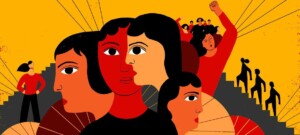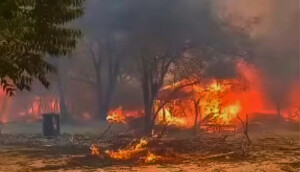Displaced in South and North Darfur call for help
Displaced people living in Sakali camp near Nyala, capital of South Darfur, are “short of almost everything”, a women leader told Radio Dabanga. In North Darfur returnees are in need of aid and protection as well.
 A displaced woman at Kalma camp, near Nyala in South Darfur (Albert González Farran / UNAMID)
A displaced woman at Kalma camp, near Nyala in South Darfur (Albert González Farran / UNAMID)
Displaced people living in Sakali camp near Nyala, capital of South Darfur, are “short of almost everything”, a women leader told Radio Dabanga. In North Darfur returnees are in need of aid and protection as well.
The Eid El Adha (the Muslim Feast of the Sacrifice that began on Saturday) passed in “an atmosphere of sadness due to the dire economic conditions and the insecurity in and around the camp,” Awatef Abdelrahman Yousef, women leader in the Sakali camp for the displaced said.
“The people are short of almost everything,” she explained. “The scarcity of basic necessities of life such as drinking water and food has prompted women to go out daily and try to find work in the villages of voluntary return, but the income they earn in this way does not cover even a part of the daily costs of life.”
She said that the only water pump in the camp broke down “a while ago”. It “has been taken for maintenance and has not been returned yet”.
Furthermore, the “health services are only available for those who are able to pay the costs of examination and treatment, with the exception of vaccinations for children and pregnant women, and vaccinations against COVID-19, which are free”.
Yousef also complained about the rampant insecurity hampering the women to search for work outside the camp. “Groups of armed men who may belong to government forces as they wearing military uniforms, are roaming the area and attack and rob the people,” she said. “Those forces urgently need to be re-structured and merged into one well-trained army, under a strong general command.”
The women leader appealed to “humanitarian aid organisations, charitable organizations, and people with compassionate hearts to provide urgent assistance to the women in the camp”. She stressed the need for food, “as the health status of mothers and children is inseparable from balanced nutrition”.
The UN World Food Programme (WFP) warned last month that "a record 15 million people in Sudan – one-third of the population – are currently facing acute food insecurity".
Yesterday, the WFP informed Radio Dabanga that due to a funding shortfall of $366 million for 2022, the organisation is having to prioritise assistance based on the resources available and "make heart wrenching decisions, knowing that we cannot help everyone in Sudan who needs it”.
Returnees
About 60 displaced families in north Darfur returned to their areas of origin in El Fasher locality yesterday.
The displaced, who found refuge in the Zamzam camp, El Fasher town, and the area of El Majdoub, after having been driven from their homes by attacks on their villages in the Koweim area more than seven months ago.
They were received by Native Administration* leaders in Koweim, headed by Kamal Zakaria.
In his welcome speech yesterday evening, he called on the North Darfur government and Security Committee to provide security for the people living in the Koweim area, and protect the farms during the agricultural season.
Zakaria further appealed to “international organisations, civil society and charities to help the returnees by providing them with shelter and all the necessary aid”.
About 2.5 million people live in displacement camps across Darfur, the UN refugee agency (UNHCR) said end last year. Reuters in December quoted aid groups saying that about 430,000 people were displaced in 2021, a four-fold increase over 2020.
According to the Darfur Bar Association (DBA), the Native Administration, instituted by British colonial authorities, did not represent the real local leaders during the rule of dictator Omar Al Bashir, 1989-2019). “It was only a tool used by ousted President Omar Al Bashir until his last days in power to prevent the escalation of the uprising.”











 and then
and then